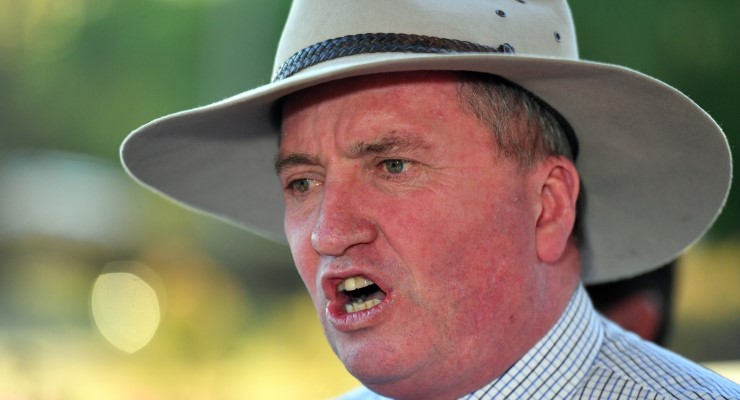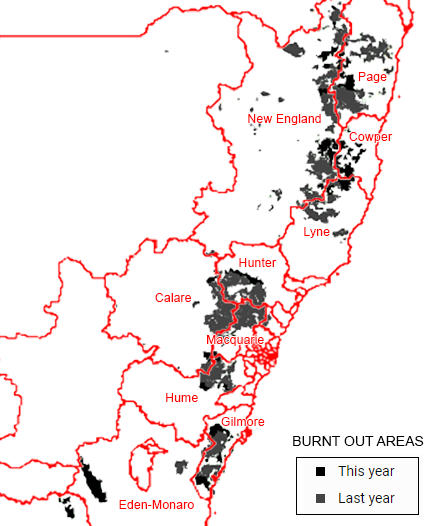
If the last fortnight has taught us nothing else, it’s that Scott Morrison heads a government that is acutely conscious of the sensitivity of marginal seats.
So it presumably hasn’t escaped his notice that a number of such seats have been at the centre of another issue bedevilling the government — the ongoing bushfire crisis.
For the most part, bushfires are associated with the country, which is in turn associated with conservative politics. This is a fact reflected in the hard climate skepticism of a number of those who represent the most heavily impacted areas.
Much of Energy Minister Angus Taylor’s electorate of Hume has been blackened by the Green Wattle Creek bushfire, which blazed for two months. Several lives have been lost in New England, which local member Barnaby Joyce blamed on meddling by the Greens.
However, the burnt-out areas include a number of notable exceptions to the rule: the hinterland of Canberra, which lies within that city’s progressive orbit; the traditionally Labor-voting constituency of the Blue Mountains; and the sea-changer and tourist towns of the NSW South Coast.
When combined with surrounding conservative rural territory, these areas form some of the classic litmus-test seats of Australian politics.
The Blue Mountains is accommodated by Macquarie, which emerged from last year’s election as the most marginal seat in the country after Labor’s Susan Templeman held on by 371 votes.
In the south of the state, some of the most vivid images of the crisis emerged from Batemans Bay in the seat of Gilmore — where voters thwarted Warren Mundine’s bid for parliament by returning a Labor member for the first time since 1996.
But perhaps the most intriguing case is the former bellwether seat of Eden-Monaro. This seat went the way of the winning party at 17 successive elections from 1972 to 2013, before Mike Kelly scored narrow wins for Labor against the grain in 2016 and 2019.
Eden-Monaro encompasses the Labor-voting Canberra satellite town of Queanbeyan, the rural Monaro region, much of the South Coast, and the fire-ravaged town of Cobargo (where Scott Morrison was famously given short shrift by locals after his return from Hawaii).

The political temperature in Eden-Monaro may be of immediate significance, as there were rumours — which Kelly said were untrue — in October that Kelly was about to quit politics after the disappointments of the election defeat and his failure to win a coveted promotion.
What’s more, it was said that tough-talking state Nationals leader John Barilaro, who holds the corresponding state seat of Monaro, was so confident of his standing that he planned to win the ensuing by-election for his party and then depose its tottering leader, Michael McCormack.
Tellingly, this notion is no longer featuring in assessments of what might happen if McCormack goes under, as seems increasingly likely.
While each of these seats is held by Labor, any or all of them could prove decisive at the next election if the Coalition can’t repeat the more exceptional of its victories in Queensland and Tasmania.
As such, there is a lot at stake in the culture war over responsibility for the fires and the distinctive ways it is playing out in urban and regional Australia.
Certainly it’s clear that concern about climate change has reached a new pitch, with the latest monthly Ipsos Issues Monitor survey finding the environment to be the top-ranked issue for the first time since the series began in 2010.
However, previously unpublished breakdowns from last fortnight’s Essential Research poll show a higher rate of climate skepticism in regional areas; 35% of respondents said the bushfires were unlikely to be linked to climate change, compared with 22% in the capital cities.
While this still left a majority acknowledging a link, regional respondents were even more emphatically of the view that “environmentalists have made this year’s bushfires much worse by preventing hazard reduction burns”. Seventy-five percent expressed agreement with this proposition, including 53% who strongly agreed.
These findings point to the ingrained cultural hostility environmental politics faces in much of regional Australia. The biggest electoral impact of the fires may yet be felt in the smoke-choked cities rather than the areas most directly affected.








Re the poll about environmentalists making bushfires worse…
I am sick of polls which ask questions based on false/contestable premises or fail to define terms. A recent effort on “political correctness” is another example.
Sir Humphrey Appleby nailed this brilliantly forty years ago. Word the same question two different ways- get two different answers.
If these polls are anywhere correct, it is simply mind-blowing that people in rural areas affected by the recent bushfires appear to blame everyone else but those who are at fault.
Are they all THAT stupid? Maybe when it all happens again next year, and they have had time to hear the experts who say that ‘hazard reduction burns’ have almost NO effect on these types of fires…perhaps they will wake up to themselves?
Faint hope…I know!!
I think there are a lot of people who would rather actually die before they would ever admit to being wrong. The human mind is capable of soaring to dizzy heights of creativity but conversely is also capable of plunging the depths of bottomless stupidity.
Only due to the failure to provide alternatives is the Rightist portrayal of Adani’s fantasy scheme so appealing to the unemployed and threatened of Townville and the region.
Likewise, the global heating denialism of the regional conservatives is partly because no leader is giving them any compromise option. Ironically, the Greens are striking in their silence, wasting their best political opportunity for two generations (and destroying their credibility).
Political change is not restricted to a day of decision every few years; even morrison has shown serious action (however destructive) once an issue became politically powerful. To get action now, make it an issue now.
Shorten could have and Labor still can do two quite easy and progressive things:
(1) undertake to increase Newstart by $75 a week within three months of taking office, with no worsening of any prerequisites.
Never fear, such ideas are utterly unwelcome to morrison’s coal-huggers and Shorten now Albanese’s cronies.
(2) As advocated by the 2008 region-building concept proposed by The Centre of Full Employment and Equity at the University of Newcastle, and Jobs Australia Pty Ltd: use GBEs (government business enterprises) and public works to strengthen and diversify local economies, plus a massive R&D programme into our natural and agricultural environments as the basis for local adaptation.
“regional respondents were even more emphatically of the view that “environmentalists have made this year’s bushfires much worse by preventing hazard reduction burns”.
Honestly, I love our regional people and countryside, I am left bereft at how they can carry such bullshit against the best advice from every expert, including the unimpeachable Shane Fitzsimons, NSW rural fire chief.
FFS, it isn’t true, and there is reasonable evidence that our hazard reduction burning leads to thicker undergrowth for when the next fire goes through. And what of the fires in S.A. that just tore through farmland, crop areas, how much hazard reduction has to be done to be less than an 18” high crop of wheat.
It’s beyond mental. I don’t know how much this survey reflects reality, but farmers need to work out that The Greens are their allies, not the National mining and big at party.
It’s enervating.